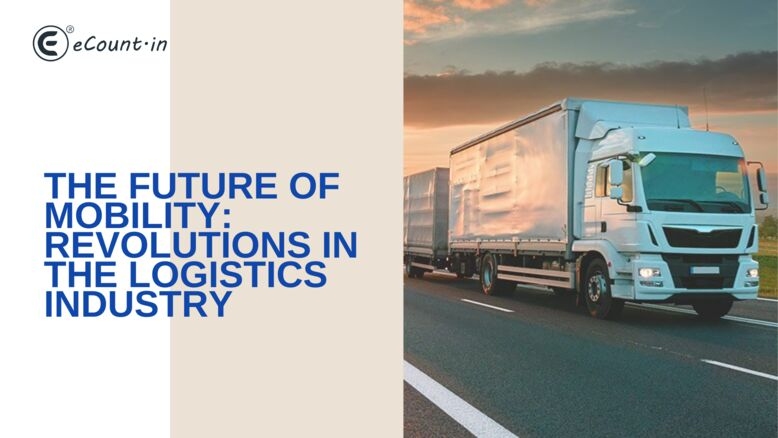The Future of Mobility: Revolutions in the Logistics Industry
29-07-2024

In a few decades, the global marketplace and commercialization have been growing at their peak and hopefully, it will be in the future. The reason is the advancement in logistics, which has made a major contribution to their growth.
The logistics industry is the foundation of international trade since it ensures the successful and efficient movement of goods from one location to another. To have more grasp and convenient operations of the logistics, mobility is one aspect that holds great importance. It improves processes such as real-time monitoring and management of the goods, enabling smooth operations with timely deliveries. It facilitates flawless communication and harmonizes supply chain management.
If we take a glance into the future, we can see an advanced and automated logistics industry with the help of technology, i.e., TMS transport management system, sustainability involvements, and digital connectivity. This article is your guide to understanding what the future of mobility will look like and its impact on logistics.
A Glimpse Into the Tech-Advancements Driving Mobility
Introduction to autonomous vehicles could be the most exciting and transformative change in the mobility aspect of the logistics sector. Till now we have seen autonomous technology and Advanced Driver Assistance Systems (ADAS) being used in the cars running on the road. This technology is not reliable enough to be used for logistics operations. However, self-driving delivery trucks and drones are considered to be transformative for logistics operations in the near future. It will solve the current problems associated with logistics including roadblocks, inefficient route planning, redundant idle time as well as fuel consumption.
There will be fully automated solutions available such as the Employee Transport Management System which reduces human mistakes, enabling smooth and reliable transport operations. Implementing a transportation management system might involve a good initial cost but after a certain period, it helps businesses save money, which could be used for strategic aspects.
Sustainable Practices in Logistics
Sustainable or we can say green logistics has become a hot topic in the global marketplace since we are facing many issues such as environmental degradation and economic issues as well.
Sustainability could be adapted by replacing internal combustion engine vehicles with electric (EV) or hybrid vehicles for transport operations. It could be a little challenging for businesses that have been in the market for a longer period and have been using traditional transportation approaches.
However, for the startups and new businesses, it might be easier to acquire EVs in their initial phases. First, they have to understand how transport management system works and accordingly start adapting sustainable approaches to their operations by bearing initial costs in mind.
Other than electric vehicles, businesses can follow other sustainable approaches such as reducing waste materials, using eco-friendly materials, and route optimization. By minimizing the use of equipment and materials that hurt the environment and businesses’ financial conditions.
Digital Transformation and Connectivity
Logistics businesses can leverage the feature of transport management system reports by using TMS solutions for better forecasting of the routes. It not only removes unnecessary idle time from the transport process but also helps analyze rates, future demand, and profitability. Along with it, the system offers built-in integration with various critical aspects of transportation, from inventory and route optimization to accounting management. The integration ensures effective operations without much effort and reduces the risk of errors.
With the help of advanced technology such as GPS and RFID, real-time monitoring and management of the fleet becomes swift. Fleet managers can make data-driven decisions, which can assist in enhancing overall fleet management.
Just as businesses in other industries, fleet businesses are also leveraging blockchain technology. It enables an extra layer of security and transparency in transportation operations. The integrity of the records of all the transactions made is maintained with the help of blockchain technology, reducing fraud and mistakes.
Potential Challenges in the Future
Along with various advantages, there are some challenges that fleet businesses have to cope up with when it comes to development in mobility.
Legal and regulatory issues may arise and lead to time-consuming operations and test the patience levels as well. Rules and regulations may vary across regions, which might be troublesome for international fleet business to standardize their transportation processes. The integration of the different vehicles and equipment might also add more trouble for the fleet managers.
It is common to face privacy and security challenges when you are handling business digitally. Therefore, it is critical to take time and find a TMS system that not only offers more features and integration but also protects confidential documentation. A reliable solution ensures transport management system project documentation pdf is easily accessible for fleet managers to get insights into critical data and make necessary decisions.
Summary
The fleet industry is on the verge of witnessing a mobility revolution. The tech. advancement, sustainability initiatives, and digital transformation hold significant importance in this revolution. While change is the only constant, the future promises more legendary changes within the fleet industry, enabling more opportunities for businesses. To conclude this article, it is paramount for businesses to adapt to changes when it is needed, otherwise they will lose their place in the market and face consequences.